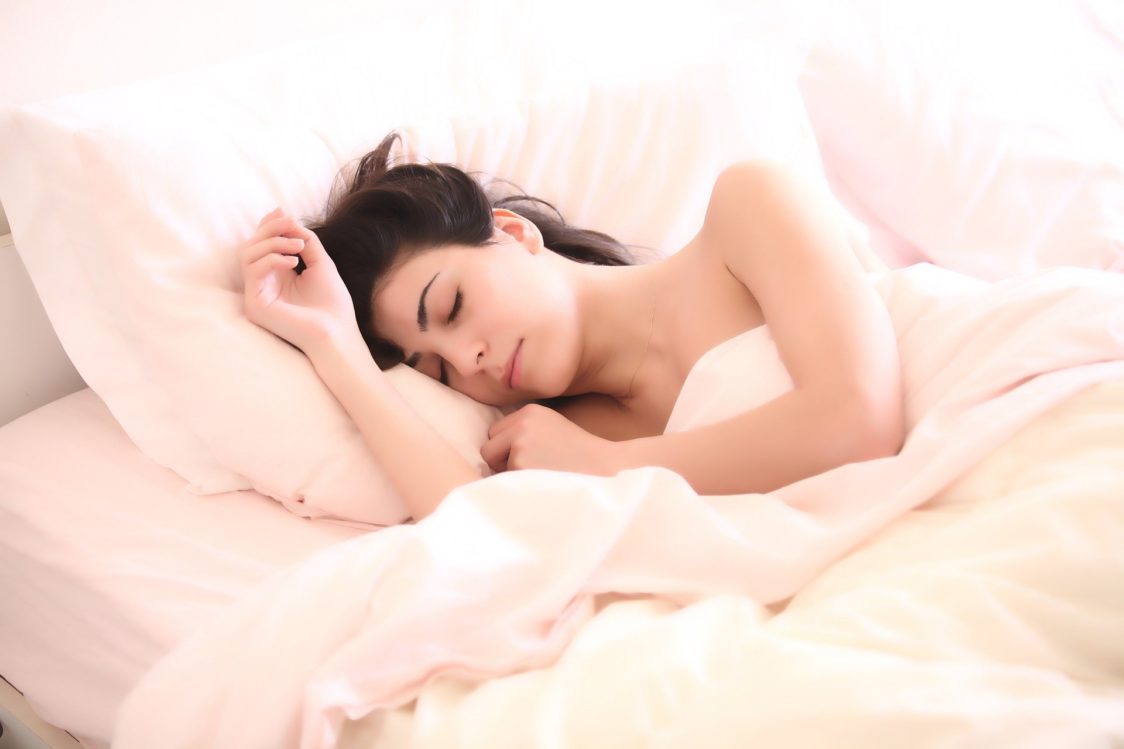Table of Contents
Melatonin is a hormone with the function of regulating our sleep cycle. Read the article about melatonin, its effect on sleep, the benefits of its supplementation for certain difficulties or safety and its possible side effects.
What is Melatonin?
Melatonin is a neurohormone that is responsible for regulating sleep. This is a simple description of the importance of melatonin to humans. It is produced in the brain through the epiphysis, a small gland in the brain with the function of producing and regulating the activity of certain hormones. It may seem that melatonin is only the sleep privilege of humans, the truth is that it is a little longer on our planet. Melatonin is also found in bacteria, algae, mushrooms, and even vegetables and fruits. [1] [3] [4]
Melatonin, or also N-acetyl-5-methoxy-tryptamine, is an indoleamine, i.e. it is an indole derivative that contains an amine group. In the body, it is formed from the amino acid tryptophan, where it is converted to serotonin by an enzyme and subsequently to melatonin in a further reaction. [1] [2]
Melatonin was first isolated from the cow’s epiphysis in 1958. It was discovered and isolated by Aaron Lerner, but has long been considered an animal neurohormone with an effect on circadian rhythms and other processes in the body. Subsequent research on melatonin has shown its presence in several organisms. It has been found not only it affects sleep regulation, and also, it has anti-inflammatory effects, improves the immune system, “fights” free radicals, or alleviates jet lag and insomnia. [5] [6] [7]

Circadian cycle and melatonin levels
Did you know that we have an internal clock “installed” in our body that synchronizes with the alternation of day and night? This is due to the light that enters the human eye and is a regulator of melatonin in the summer. The imaginary clock is in the brain, specifically in the part of the suprachiasmatic nuclei that stops melatonin production during the day. On the contrary, it is not active at night, which leads to the resumption of production. Have you ever heard the recommendation that you should not use your phone or watch TV for some time before going to bed? By illuminating the eyes during the biological night, you reduce the production of melatonin. [8]
The term circadian rhythm refers to a cycle in which an organism determines biological and psychological processes, such as sleep, awakening, or eating. The circadian rhythm controls the already mentioned suprachiasmatic nuclei and is influenced by sunlight and temperature. In the eyes, we have receptors that, when being in the dark, send a message to the suprachiasmatic nuclei, which triggers the production of melatonin. It’s up to you whether you fall asleep with the lamp on, watch video from your phone before bed, or turn off all light sources completely one hour before bed. We have a “guard” in our eyes who can be misled by light before going to bed. Do your own experiment and try to change your evening ritual. You can write how it turned out in the comment below. [15]

The amount of melatonin in the body may vary, but this is not a health problem. It is also not known that reduced melatonin production has any effect on health. However, if you take higher doses of melatonin as a supplement, you may experience lower body temperature and drowsiness. High doses affect the functioning of the reproductive system and there is evidence of antioxidant effects with the unknown significance. When using melatonin, it is definitely always important to follow the manufacturer’s instructions. [8]
Sleep is an important biological need that affects the overall health and functioning of the body. Want to learn more about the importance of sleep for health and muscle? Read our article – How to improve sleep and how it affects health and muscle growth?
Use of melatonin
Melatonin can be supplemented in the form of various nutritional supplements and is often one of the means for getting a night of better sleep. There are different supplements on the market that are different. The daily dose also varies, and it can be in the range of 0.5 – 10 mg depending on the legislation. However, in addition to sleep improvement, we will introduce you to other potential benefits of melatonin.[9]
Sleep support
According to several studies, melatonin is beneficial for promoting sleep and is a popular supplement, for example in the case of insomnia. There are more effective supplements for this purpose, but the advantage of melatonin is that it has fewer side effects. According to a 2016 study, melatonin is also beneficial for improving sleep in people with cancer who suffer from insomnia. A review of studies from 2014, in turn, points to the promising importance of melatonin in jet lag and, to a limited extent, for insomnia. At the end of the study, the authors also claim that the obtained data cannot confirm the positive effect of melatonin on the onset and effectiveness of sleep. They do not recommend the use of melatonin for people working on work shifts. The aim of the article is to provide an unbiased view of melatonin and several sources point to its lower effectiveness. However, this does not mean that it will not help you fall asleep in case of problems, for example, due to traveling by plane. [9] [10] [11] [12]

Melatonin is beneficial in reducing anxiety before surgery. Its use can help with sleep problems in children. Small patients with certain conditions, such as ADHD, asthma, or atopic dermatitis, may have trouble sleeping. There is scientific evidence for the benefit of melatonin, but several questions remain with children and melatonin, so it is best to consult your doctor about its possible use. Among other things, melatonin can also be used in delayed sleep syndrome (DSWPD). [13]
Melatonin and seasonal depression
Seasonal depression is another name for the seasonal affective disorder (SAD), which is associated with changing seasons. Symptoms of SAD usually appear between late autumn and early winter, but can also occur in late spring and early summer. Its manifestations include a lack of energy and interest in favorite activities or difficulty sleeping and feeling depressed. This is not a rare condition, as this type of depression can affect up to 10% of the population. According to some research, melatonin supplementation has been effective in reducing its symptoms. Seasonal depression could be associated with changes in circadian rhythm, so the use of melatonin might make sense. In the winter, the ratio of day and night part of the day changes, which can trigger depression. In addition to changes in “internal clock” and melatonin levels, serotonin levels may also be a factor. Further research is needed to determine the effect of melatonin on the symptoms of this depression. Who knows, this condition may disappear in the near future thanks to research and the use of melatonin. [9] [14]

In addition to improving sleep and manifestations of seasonal depression, there is scientific evidence that melatonin may help with the following diseases [10] [16]:
- Headaches – can be useful in Horton’s syndrome or migraine.
- Tinnitus – this is the perception of sound in the ears, such as effervescence or ringing, and some studies show some improvement in the symptoms of this condition.
- Cancer – studies focusing on several types of cancer suggest possible benefits of melatonin as a supportive treatment.
- Alzheimer’s disease – melatonin may slow the cognitive decline associated with this disease.
Melatonin in nutritional supplements
Melatonin supplements can be purchased in the form of capsules, sprays, or tablets. Depending on your preferences, they exist in natural or synthetic form, with the natural one coming from the animal’s epiphysis. [18] [19]
In the US, melatonin is considered a nutritional supplement, but in some countries, it is considered a drug and can only be obtained on prescription.It is not harmful to check whether the sale of melatonin-containing supplements is allowed in a given country before attempting to buy. [13]
You might be interested in these products:
Safety of melatonin
Taking melatonin in the recommended amounts is generally considered safe. However, it can also cause drowsiness, headaches, dizziness, or nausea. It is not advisable to drive heavy machinery for 5 hours after using melatonin, especially because of drowsiness. Likewise, melatonin is not suitable for people with autoimmune diseases, and less often symptoms occurred, such as confusion, feelings of depression, or abdominal cramps. As you certainly do with other supplements, read the package leaflet to find out if there is a barrier to melatonin use. According to studies, melatonin is safe and associated with minimal side effects for the adult. Melatonin may affect other medicines, in which case consult your doctor in advance. [17]

Melatonin is a hormone with the function of regulating human sleep. It is a part of medications and supplements because it can help with sleep problems, seasonal depression or insomnia, and jet lag. We believe that our article has provided you with all the necessary information about melatonin and its effect on the human body. Do you want your friends to know about the melatonin? Feel free to support the article by sharing.
[1] Antonio Carrillo-Vico Patricia J. Lardone, Nuria Álvarez-Sánchez, Ana Rodríguez-Rodríguez, Juan M. Guerrero - Melatonin: Buffering the Immune System - – https://www.ncbi.nlm.nih.gov/pmc/articles/PMC3645767/
[2] Indoleamine – https://www.merriam-webster.com/medical/indoleamine
[3] Kamal Patel - Melatonin – https://examine.com/supplements/melatonin/
[4] Neel Duggal - 5 Functions of the Pineal Gland – https://www.healthline.com/health/pineal-gland-function
[5] Bahare Salehi, Farukh Sharopov, Patrick Valere Tsouh Fokou, Agnieszka Kobylinska, Lilian de Jonge, Kathryn Tadio, Javad Sharifi-Rad, Malgorzata M. Posmyk, Miquel Martorell, Natália Martins, Marcello Iriti - Melatonin in Medicinal and Food Plants: Occurrence, Bioavailability, and Health Potential for Humans – https://www.ncbi.nlm.nih.gov/pmc/articles/PMC6678868/
[6] Xiao Meng, Ya Li, Sha Li, Yue Zhou, Ren-You Gan, Dong-Ping Xu, Hua-Bin Li - Dietary Sources and Bioactivities of Melatonin – https://www.ncbi.nlm.nih.gov/pmc/articles/PMC5409706/
[7] Sylvie Tordjman, Sylvie Chokron, Richard Delorme, Annaëlle Charrier, Eric Bellissant, Nemat Jaafari, Claire Fougerou - Melatonin: Pharmacology, Functions and Therapeutic Benefits – https://www.ncbi.nlm.nih.gov/pmc/articles/PMC5405617/
[8] Melatonin – https://www.yourhormones.info/hormones/melatonin/
[9] Rachael Link - Melatonin: Benefits, Uses, Side Effects and Dosage – https://www.healthline.com/nutrition/melatonin
[10] Stephanie Watson - All you need to know about melatonin – https://www.medicalnewstoday.com/articles/232138
[11] Madhuri S Kurdi, Sindhu Priya Muthukalai - The Efficacy of Oral Melatonin in Improving Sleep in Cancer Patients with Insomnia: A Randomized Double-Blind Placebo-Controlled Study – https://www.ncbi.nlm.nih.gov/pmc/articles/PMC4973490/
[12] Rebecca B Costello, Cynthia V Lentino, Courtney C Boyd, Meghan L O’Connell, Cindy C Crawford, Meredith L Sprengel, Patricia A Deuster - The effectiveness of melatonin for promoting healthy sleep: a rapid evidence assessment of the literature – https://www.ncbi.nlm.nih.gov/pmc/articles/PMC4273450/
[13] Melatonin: What You Need To Know – https://www.nccih.nih.gov/health/melatonin-what-you-need-to-know
[14] Seasonal affective disorder (SAD) – https://www.mayoclinic.org/diseases-conditions/seasonal-affective-disorder/symptoms-causes/syc-20364651
[15] Circadian Rhythm – https://www.psychologytoday.com/intl/basics/circadian-rhythm
[16] Tinnitus – https://www.mayoclinic.org/diseases-conditions/tinnitus/symptoms-causes/syc-20350156
[17] Melatonin – https://www.mayoclinic.org/drugs-supplements-melatonin/art-20363071
[18] Eliza Savage - The 9 Best Melatonin Supplements of 2020, According to a Dietitian – https://www.verywellhealth.com/best-melatonin-supplements-4587057#:~:text=Form%3A%20Melatonin%20supplements%20come%20in,a%20good%20option%20for%20you.
[19] What Is Melatonin? – https://www.webmd.com/sleep-disorders/what-is-melatonin

